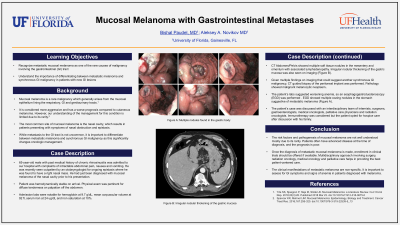Monday Poster Session
Category: Stomach
P2829 - Mucosal Melanoma With Gastrointestinal Metastases
Monday, October 23, 2023
10:30 AM - 4:15 PM PT
Location: Exhibit Hall

Has Audio
.jpg)
Bishal Paudel, MD
University of Florida
Gainesville, FL
Presenting Author(s)
Bishal Paudel, MD, Aleksey A.. Novikov, MD
University of Florida, Gainesville, FL
Introduction: Mucosal melanoma is a rare malignancy which generally arises from the mucosal epithelium lining the respiratory, gastrointestinal (GI) and genitourinary tracts. It is considered more aggressive and has a worse prognosis compared to cutaneous melanoma. The most common site of mucosal melanoma is the nasal cavity, which results in patients presenting with symptoms of nasal obstruction and epistaxis. While metastasis to the GI tract is not uncommon, it is important to differentiate between metastatic melanoma and synchronous GI malignancy as this significantly changes oncologic management.
Case Description/Methods: We present the case of a 65-year-old male who was admitted with complaints of nausea, vomiting and abdominal pain. He was recently diagnosed with mucosal melanoma of the nasal cavity after being evaluated for ongoing epistaxis. On presentation, labs were notable for hemoglobin at 9.7 g/dL, serum iron at 24 ug/dL and iron saturation at 10%. Physical exam was pertinent for diffuse tenderness on palpation of abdomen. CT Abdomen/Pelvis showed multiple soft tissue nodules in the mesentery and omentum with associated lymphadenopathy. The stomach appeared irregular on CT, which was concerning for malignancy.
Given multiple findings on imaging that could have potentially been due to another synchronous GI malignancy, CT guided biopsy of the peritoneal implant was performed. Pathology showed malignant melanocytic neoplasm. An esophagogastroduodenoscopy (EGD) was performed due to worsening anemia. EGD showed multiple oozing nodules in the stomach suggestive of metastatic melanoma (Figure 1). The patient’s case was then discussed with an interdisciplinary team of oncologists, surgeons, palliative care physicians and radiation oncologists. The patient is currently working with palliative care physicians with the goal of focusing on comfort.
Discussion: The risk factors and pathogenesis of mucosal melanoma are not well understood mostly due to its rarity. Patients often have advanced disease at the time of diagnosis, and the prognosis is poor. Mucosal melanoma tends to metastasize to the lymph nodes, the lungs and the GI tract. The clinical manifestations of GI metastatic melanoma are non-specific. It is important to assess for GI symptoms and signs of anemia in patients diagnosed with melanoma.

Disclosures:
Bishal Paudel, MD, Aleksey A.. Novikov, MD. P2829 - Mucosal Melanoma With Gastrointestinal Metastases, ACG 2023 Annual Scientific Meeting Abstracts. Vancouver, BC, Canada: American College of Gastroenterology.
University of Florida, Gainesville, FL
Introduction: Mucosal melanoma is a rare malignancy which generally arises from the mucosal epithelium lining the respiratory, gastrointestinal (GI) and genitourinary tracts. It is considered more aggressive and has a worse prognosis compared to cutaneous melanoma. The most common site of mucosal melanoma is the nasal cavity, which results in patients presenting with symptoms of nasal obstruction and epistaxis. While metastasis to the GI tract is not uncommon, it is important to differentiate between metastatic melanoma and synchronous GI malignancy as this significantly changes oncologic management.
Case Description/Methods: We present the case of a 65-year-old male who was admitted with complaints of nausea, vomiting and abdominal pain. He was recently diagnosed with mucosal melanoma of the nasal cavity after being evaluated for ongoing epistaxis. On presentation, labs were notable for hemoglobin at 9.7 g/dL, serum iron at 24 ug/dL and iron saturation at 10%. Physical exam was pertinent for diffuse tenderness on palpation of abdomen. CT Abdomen/Pelvis showed multiple soft tissue nodules in the mesentery and omentum with associated lymphadenopathy. The stomach appeared irregular on CT, which was concerning for malignancy.
Given multiple findings on imaging that could have potentially been due to another synchronous GI malignancy, CT guided biopsy of the peritoneal implant was performed. Pathology showed malignant melanocytic neoplasm. An esophagogastroduodenoscopy (EGD) was performed due to worsening anemia. EGD showed multiple oozing nodules in the stomach suggestive of metastatic melanoma (Figure 1). The patient’s case was then discussed with an interdisciplinary team of oncologists, surgeons, palliative care physicians and radiation oncologists. The patient is currently working with palliative care physicians with the goal of focusing on comfort.
Discussion: The risk factors and pathogenesis of mucosal melanoma are not well understood mostly due to its rarity. Patients often have advanced disease at the time of diagnosis, and the prognosis is poor. Mucosal melanoma tends to metastasize to the lymph nodes, the lungs and the GI tract. The clinical manifestations of GI metastatic melanoma are non-specific. It is important to assess for GI symptoms and signs of anemia in patients diagnosed with melanoma.

Figure: Figure 1: Multiple nodules found in the gastric body
Disclosures:
Bishal Paudel indicated no relevant financial relationships.
Aleksey Novikov indicated no relevant financial relationships.
Bishal Paudel, MD, Aleksey A.. Novikov, MD. P2829 - Mucosal Melanoma With Gastrointestinal Metastases, ACG 2023 Annual Scientific Meeting Abstracts. Vancouver, BC, Canada: American College of Gastroenterology.
